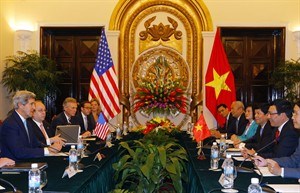
U.S. Secretary of State John Kerry, left, talks with Vietnamese Foreign Minister Pham Binh Minh, second right, in Hanoi Monday, Dec. 16, 2013. Secretary of State Kerry is in Vietnam pressing the communist country on democratic and economic reforms and offering U.S. assistance to protect its maritime borders. (AP Photo/Brian Snyder, Pool)
December 16, 2013 - 12:30 AM
HANOI, Vietnam - The United States will boost maritime security assistance to China's smaller neighbours amid rising tensions over disputed territories in the South China Sea, U.S. Secretary of State John Kerry announced on Monday during a visit to Vietnam, where he also pressed the communist government on human rights and democratic and economic reforms.
The U.S. will provide an additional $32.5 million to help Southeast Asian nations protect their territorial waters and secure navigational freedom, Kerry said. Vietnam alone will receive up to $18 million, including five fast patrol-boats that will be given to the Vietnamese Coast Guard, he said. With the new contribution, U.S. maritime security assistance to the region will exceed $156 million over the next two years, the State Department said.
Kerry's visit to Vietnam, to be followed by a stop in the Philippines on Tuesday, comes as tensions over conflicting claims to territory in the South China Sea have risen dramatically and many of China's neighbours are seeking assurances from Washington that it will remain a guarantor of maritime security in the Asia-Pacific region. Both Vietnam and the Philippines are involved in disputes with China.
China's growing assertiveness in the region — including the establishment of a new air defence zone over parts of the East China Sea over strenuous U.S. objections — has alarmed many.
Beijing regards the entire South China Sea and island groups within it as its own and interprets international law as giving it the right to police foreign naval activity there. The Chinese navy is operating with increasing frequency in the South China Sea and around Japan as part of China's development of its blue water navy.
Tensions were highlighted earlier this month when a Chinese warship nearly collided with an American cruiser in the South China Sea. The U.S. Pacific Fleet has said the USS Cowpens was operating in international waters and had to manoeuvr to avoid hitting China's lone aircraft carrier, Liaoning, on Dec. 5.
However, a Chinese newspaper reported on Monday that the U.S. ship had first harassed the Liaoning and its group of support ships.
China's Global Times newspaper cited an unnamed source it described as being familiar with the confrontation as saying that the USS Cowpens had been getting too close to a Chinese naval drill and that the American vessel "took offensive actions" toward the formation and entered within 45 kilometres (30 miles) of the Chinese fleet's "inner defence layer."
China vigorously opposes all U.S. Naval activity and intelligence gathering in the region. The Pacific Fleet says it's not uncommon for navies to operate in close proximity, and that's why it is paramount they all follow international standards for maritime "rules of the road."
The U.S. has said repeatedly that it does not have a position on the competing sovereignty claims, but it has said that freedom of navigation in one of the world's busiest commercial maritime shipping zones is a national security interest and insists on its Navy's right to transit the area and collect surveillance data.
The Obama administration has been urging China and the Association of Southeast Asian Nations to adopt binding rules of conduct for activity in the South China Sea.
In addition to maritime security, Kerry, who is on his 14th visit to Vietnam since the end of the war in 1975 but his first as secretary of state, pressed Vietnamese officials to release political prisoners, improve its human rights record, particularly on religious and Internet freedoms, and continue with free-market economic reforms. Those reforms will be critical to overall improvement in U.S.-Vietnamese relations as well as to Hanoi reaping full benefits of a major trade agreement, the Trans Pacific Partnership, that the U.S. is negotiating with 11 Asia-Pacific nations, including Vietnam, according to American officials.
News from © The Associated Press, 2013